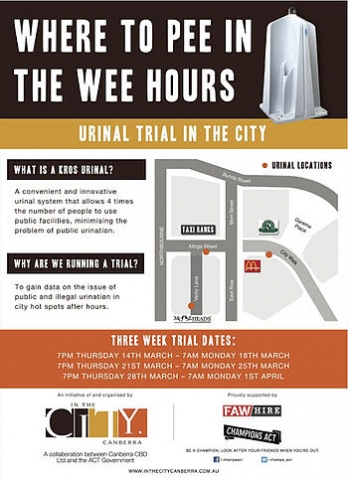International: Flushed with success over urinal trials
Canberra CBD Limited (CCBD) released data this week about a urinal trial in the Australian Capital Territory (ACT)’s Central Business District (CBD) this past weekend that showed the temporary urinals collected 220 litres of urine in a four day period between 7pm and 7am on Thursday, Friday, Saturday and Sunday nights. Estimates showed that 1,200 men relieved themselves in this period, with 450 of them doing so on Saturday night.
A number of businesses in the CBD had complained about men using storefronts and streets to relieve themselves despite the possibility of AU$200 on-the-spot fines. 277 people have been fined in the territory in the past year, with 228 of them being fined for public urination in the CBD.
The urinals were placed in a number of public places including Verity Lane, at the bus interchange on the corner of Alinga Street and Verity Lane, and on City Walk near the corner of Saraton Lane. They have small doors at hip level to provide some degree of privacy despite their very public location. Barcham, writing on The Riot-ACT, notes the privacy afforded to men is limited as the doors appear to be for very short men, saying “The doors sit well below ‘business’ level, meaning they won’t actually provide privacy to anyone over 5 foot tall.”
The urinal trial is scheduled to continue over Easter weekend. In a press release issued by CCBD, CCBD’s chief executive officer is quoted as saying, “Canberra CBD is focussed on providing a clean and safe city for the broader Canberra community. […] This urinal trial is not a permanent solution, rather a trial to provide data for decision making purposes.”
Before the start of the trial, CCBD said if the trial proved successful, the ACT government could consider making the urinals a permanent fixture in the CBD. Kros Urinals is maintaining the urinals.
A survey on the Canberra Times website found 43% of respondents liked the idea of the urinals and wanted them to become permanent while only 13% thought the answer was not urinals but more policing for public urination.

























Comments